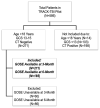Clinical Predictors of 3- and 6-Month Outcome for Mild Traumatic Brain Injury Patients with a Negative Head CT Scan in the Emergency Department: A TRACK-TBI Pilot Study
- PMID: 32369967
- PMCID: PMC7287871
- DOI: 10.3390/brainsci10050269
Clinical Predictors of 3- and 6-Month Outcome for Mild Traumatic Brain Injury Patients with a Negative Head CT Scan in the Emergency Department: A TRACK-TBI Pilot Study
Abstract
A considerable subset of mild traumatic brain injury (mTBI) patients fail to return to baseline functional status at or beyond 3 months postinjury. Identifying at-risk patients for poor outcome in the emergency department (ED) may improve surveillance strategies and referral to care. Subjects with mTBI (Glasgow Coma Scale 13-15) and negative ED initial head CT < 24 h of injury, completing 3- or 6-month functional outcome (Glasgow Outcome Scale-Extended; GOSE), were extracted from the prospective, multicenter Transforming Research and Clinical Knowledge in Traumatic Brain Injury (TRACK-TBI) Pilot study. Outcomes were dichotomized to full recovery (GOSE = 8) vs. functional deficits (GOSE < 8). Univariate predictors with p < 0.10 were considered for multivariable regression. Adjusted odds ratios (AOR) were reported for outcome predictors. Significance was assessed at p < 0.05. Subjects who completed GOSE at 3- and 6-month were 211 (GOSE < 8: 60%) and 185 (GOSE < 8: 65%). Risk factors for 6-month GOSE < 8 included less education (AOR = 0.85 per-year increase, 95% CI: (0.74-0.98)), prior psychiatric history (AOR = 3.75 (1.73-8.12)), Asian/minority race (American Indian/Alaskan/Hawaiian/Pacific Islander) (AOR = 23.99 (2.93-196.84)), and Hispanic ethnicity (AOR = 3.48 (1.29-9.37)). Risk factors for 3-month GOSE < 8 were similar with the addition of injury by assault predicting poorer outcome (AOR = 3.53 (1.17-10.63)). In mTBI patients seen in urban trauma center EDs with negative CT, education, injury by assault, Asian/minority race, and prior psychiatric history emerged as risk factors for prolonged disability.
Keywords: clinical predictors; emergency department; mild traumatic brain injury; outcome.
Conflict of interest statement
The authors declare no conflict of interest.
References
-
- Marincowitz C., Lecky F.E., Townend W., Borakati A., Fabbri A., Sheldon T.A. The Risk of Deterioration in GCS13-15 Patients with Traumatic Brain Injury Identified by Computed Tomography Imaging: A Systematic Review and Meta-Analysis. J. Neurotrauma. 2018;35:703–718. doi: 10.1089/neu.2017.5259. - DOI - PMC - PubMed
-
- Cancelliere C., Coronado V.G., Taylor C.A., Xu L. Epidemiology of Isolated Versus Nonisolated Mild Traumatic Brain Injury Treated in Emergency Departments in the United States, 2006–2012: Sociodemographic Characteristics. J. Head Trauma Rehabil. 2017;32:E37–E46. doi: 10.1097/HTR.0000000000000260. - DOI - PMC - PubMed
-
- Stein M.B., Jain S., Giacino J.T., Levin H., Dikmen S., Nelson L.D., Vassar M.J., Okonkwo D.O., Diaz-Arrastia R., Robertson C.S., et al. Risk of Posttraumatic Stress Disorder and Major Depression in Civilian Patients After Mild Traumatic Brain Injury: A TRACK-TBI Study. JAMA Psychiatry. 2019;76:249–258. doi: 10.1001/jamapsychiatry.2018.4288. - DOI - PMC - PubMed
-
- Carroll L.J., Cassidy J.D., Cancelliere C., Cote P., Hincapie C.A., Kristman V.L., Holm L.W., Borg J., Nygren-de Boussard C., Hartvigsen J., et al. Systematic Review of the Prognosis after Mild Traumatic Brain Injury in Adults: Cognitive, Psychiatric, and Mortality Outcomes: Results of the International Collaboration on Mild Traumatic Brain Injury Prognosis. Arch. Phys. Med. Rehabil. 2014;95:S152–S173. doi: 10.1016/j.apmr.2013.08.300. - DOI - PubMed


